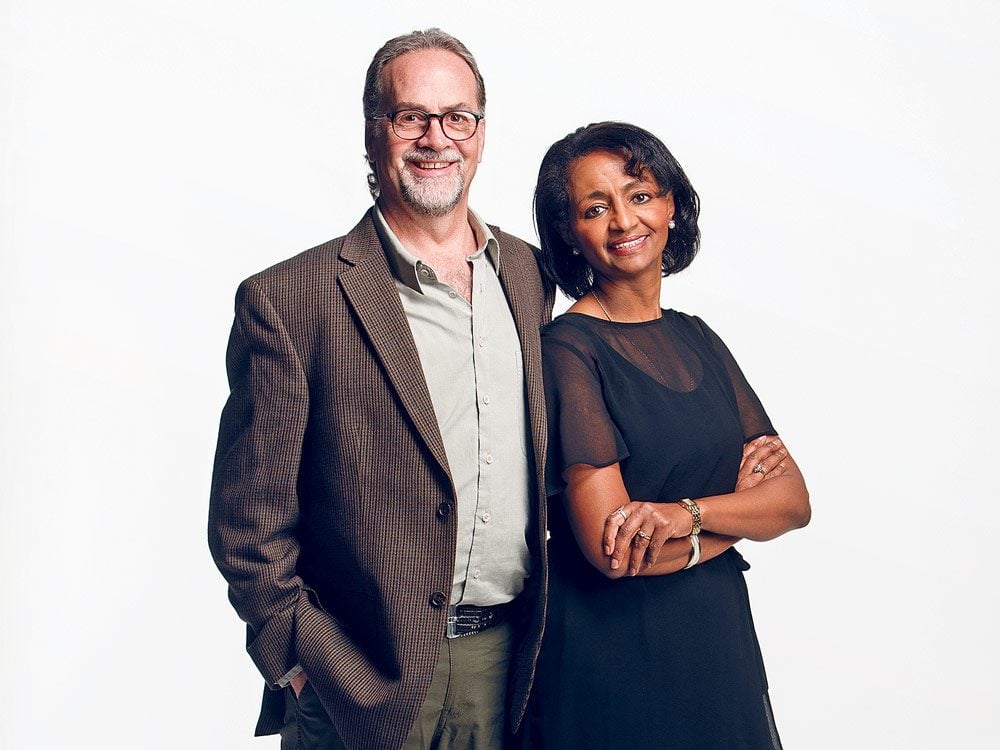How This Edmonton Teacher Helps Educate Children in Her Native Ethiopia
“We always knew we were going to do something in Ethiopia,” says Meheret Worku, who co-founded the Sustainable East Africa Education & Development Society with her husband, Scott Smillie.

Meles Wudima* fled from his village near Addis Ababa to the Ethiopian capital because he had nowhere else to go. He was five years old and both his parents were dead. He’d headed to his aunt’s, but she had seven children and couldn’t take him in permanently. Soon Wudima was participating in the street economy, along with roughly 10,000 other orphaned kids in Addis. To survive, he shined shoes, sold peanuts and begged.
Then, when he was about nine, Wudima met Meheret Worku (above).
A year earlier, in 1996, Worku had flown from Edmonton to her hometown of Addis to visit her mother for the first time in well over a decade. Accompanying Worku were her husband, Scott Smillie (a social worker, pictured above), and their two children, Rebecca, three and a half, and Rachael, 18 months. The family had come with the intention of helping street-involved children, but without a set plan.
It was one of Rebecca’s questions that finally pushed Worku and Smillie to act. “Why aren’t they wearing any shoes?” she asked about kids in the street. Worku had worked as a school teacher in Ethiopia, so children and education felt like natural starting points. And after learning that the principal of the Misrak Del elementary school was paying for an orphaned student’s uniform and living expenses, Worku thought, This is who I’m going to join forces with.
Worku had left Ethiopia in 1981 on a scholarship to Germany, but also to escape Mengistu Haile Mariam’s repressive regime. From Germany she moved to Edmonton, finished her bachelor of science degree at the University of Alberta, began teaching, met Smillie and started a family. These opportunities were thanks to her education—a gift from her father, a general in the Ethiopian army. Worku Gebre Maryiam had used his relative affluence to pay for his eight daughters and one son to attend private school, wanting to offer them what his own sisters—many of whom were illiterate—never got. Back then, Ethiopia’s school enrollment was just 25 per cent.
Maryiam died shortly before Worku left Ethiopia. His final wish, she says, was for his children to someday return to help their country.
All children can attend government school in Ethiopia, but many don’t. Uniforms, books and other expenses are one barrier; poor health or being forced into work are others. Smillie and Worku decided to focus on getting orphaned street-involved children with caregivers to class. Kids like Wudima: Worku met him on her second trip, and he started receiving supplies and food and was provided with housing shortly thereafter.
As the years ticked by, Worku continued to take calls in the middle of the night and travel back and forth between Canada and Ethiopia to ensure Wudima and dozens of others got necessities. From Edmonton, Smillie organized financial donations, including partnerships with the Knox Metropolitan United Church.
Twenty-two years on, the group the couple created—the Sustainable East Africa Education & Development Society (SEEDS)—is independent and supports 260 students in Addis and the village of Amanuel, and supplies the schools with desks, water tanks and the like.
Wudima has stayed in touch with Worku. Now 29, he has a job as a tour guide. “Some young people are addicted to drugs or they become pickpockets,” he says. “If you have school, that’s a good advantage to keep yourself from everything.” Of Worku, he says, “She’s like my mother.”
It’s a fitting tribute for an organization that stays the course. “We’re in it for the long haul,” Smillie says. “We’ve seen, based on those original kids, that education is the way out of poverty.”
Worku has an even deeper connection to their work. Seeing Ethiopian orphans thrive, she feels she’s done right by her dad. “That’s the dream of my father I’m seeing—right there in my face.”
Don’t miss out on these good news stories that will brighten your day.
*Name has been changed.



